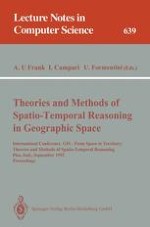1992 | ReviewPaper | Buchkapitel
Is there a relationship between spatial cognition and environmental patterns?
verfasst von : Scott M. Freundschuh
Erschienen in: Theories and Methods of Spatio-Temporal Reasoning in Geographic Space
Verlag: Springer Berlin Heidelberg
Enthalten in: Professional Book Archive
Aktivieren Sie unsere intelligente Suche, um passende Fachinhalte oder Patente zu finden.
Wählen Sie Textabschnitte aus um mit Künstlicher Intelligenz passenden Patente zu finden. powered by
Markieren Sie Textabschnitte, um KI-gestützt weitere passende Inhalte zu finden. powered by
One aspect of a fundamental theory of spatial representations is human-cognitive representation. This research includes a review of cognitive models of spatial knowledge across disciplines, upon which a proposed comprehensive model is based. This model includes geographic facts, route, and configurational knowledge as kinds of (spatial) geographical knowledge. This research also investigates the acquisition of spatial knowledge. An experiment was designed to test the hypothesis that a regular environment (gridded road pattern) promotes the acquisition of metrical configurational knowledge from procedural knowledge and greater navigation experience, whereas an irregular environment (serpentine road pattern) does not. A irregular and regular environment were used in this study. Forty subjects performed orientation, distance, and location estimation tasks in each environment, and performance was compared. The results of the experiment were varied. There was, however, tentative support to suggest that the pattern of the environment does effect the accuracy of spatial knowledge.
